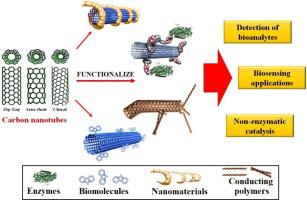Colloid and Interface Science Communications ( IF 4.5 ) Pub Date : 2021-09-04 , DOI: 10.1016/j.colcom.2021.100506 Meenakshi Pundir 1 , Parteek Prasher 2 , Katja Vasić 3 , Maja Leitgeb 3 , Ashish Kumar 4 , Rajiv Prakash 4 , Željko Knez 3 , Jitendra K. Pandey 1, 5 , Sanjay Kumar 2

|
Considerable biocompatibility, prospect of engineering the surface as per the deliberated application, and high accuracy of the results have driven the development of carbon nano tubes (CNTs) based biosensors. Enzyme catalyzed reactions occur under immensely milder physiological environments with high substrate specificity that minimizes the formation of side-products. Enzyme Immobilization represents the space-localization, or physical confinement of the enzymes that restrains their catalytic activity and improves their recyclability. The present article aims to provide a comprehensive record of the enzyme immobilization on the engineered CNTs, and their subsequent applications for the detection of various analytes. In addition, the recent advances in the functionalization techniques for enzyme-less detection of analytes on modified CNTs, their commercialization aspects and associated challenges is discussed.
中文翻译:

用于生物传感应用的酶修饰碳纳米管:机遇和挑战
相当大的生物相容性、表面工程化的前景以及结果的高精度推动了基于碳纳米管 (CNT) 的生物传感器的发展。酶催化反应发生在极其温和的生理环境下,具有高底物特异性,可最大限度地减少副产物的形成。酶固定代表酶的空间定位或物理限制,限制其催化活性并提高其可回收性。本文旨在提供酶固定在工程化碳纳米管上的综合记录,以及它们在检测各种分析物方面的后续应用。此外,用于无酶检测改性碳纳米管上分析物的功能化技术的最新进展,



























 京公网安备 11010802027423号
京公网安备 11010802027423号